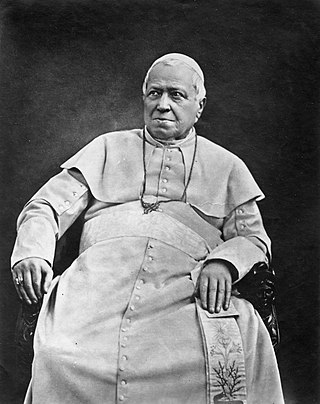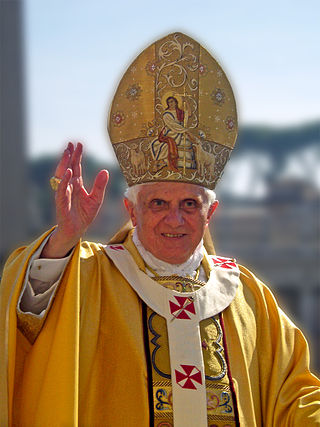
Pope Pius IX was head of the Catholic Church from 1846 to 1878. His reign of almost 32 years is the longest of any pope in history. He was notable for convoking the First Vatican Council in 1868 and for permanently losing control of the Papal States in 1870 to the Kingdom of Italy. Thereafter, he refused to leave Vatican City, declaring himself a "prisoner in the Vatican".

Pope Pius VII was head of the Catholic Church from 14 March 1800 to his death in August 1823. He ruled the Papal States from June 1800 to 17 May 1809 and again from 1814 to his death. Chiaramonti was also a monk of the Order of Saint Benedict in addition to being a well-known theologian and bishop.

Pope Pius VIII was head of the Catholic Church and ruler of the Papal States from 31 March 1829 to his death in November 1830.
The Latin phrase extra Ecclesiam nulla salus is a phrase referring to a Christian doctrine about who is to receive salvation.

The Westminster Confession of Faith, or simply the Westminster Confession, is a Reformed confession of faith. Drawn up by the 1646 Westminster Assembly as part of the Westminster Standards to be a confession of the Church of England, it became and remains the "subordinate standard" of doctrine in the Church of Scotland and has been influential within Presbyterian churches worldwide.

The Syllabus of Errors is the name given to a document issued by the Holy See under Pope Pius IX on 8 December 1864, as an appendix to his encyclical letter Quanta cura. It condemns a total of 80 propositions that the Pope considered to be errors or heresies.
Modernism in the Catholic Church describes attempts to reconcile Catholicism with modern culture, specifically an understanding of the Bible and Catholic tradition in light of the historical-critical method and new philosophical and political developments of the late 19th and early 20th centuries.

The Catholic Church, also known as the Roman Catholic Church, is the largest Christian church, with 1.28 to 1.39 billion baptized Catholics worldwide as of 2024. It is among the world's oldest and largest international institutions and has played a prominent role in the history and development of Western civilization. The church consists of 24 sui iuris churches, including the Latin Church and 23 Eastern Catholic Churches, which comprise almost 3,500 dioceses and eparchies located around the world. The pope, who is the bishop of Rome, is the chief pastor of the church. The Diocese of Rome, known as the Holy See, is the central governing authority of the church. The administrative body of the Holy See, the Roman Curia, has its principal offices in Vatican City, a small independent city-state and enclave within the Italian capital city of Rome, of which the pope is head of state.

Humanum genus is a papal encyclical promulgated on 20 April 1884 by Pope Leo XIII.
Etsi multa is a papal encyclical that was published by Pope Pius IX on November 21, 1873.

The theology of Pope Benedict XVI, as promulgated during his pontificate, consists mainly of three encyclical letters on love (2005), hope (2007), and "charity in truth" (2009), as well as apostolic documents and various speeches and interviews. Pope Benedict XVI's theology underwent developments over the years, many of which were characterized by his leadership position in the Congregation for the Doctrine of the Faith, which is entrusted with preserving the Catholic faith in its entirety.
Mirari vos, sometimes referred to as Mirari vos arbitramur, was the fourth encyclical letter of Pope Gregory XVI and was issued in August 1832. Addressed to "All Patriarchs, Primates, Archbishops, and Bishops of the Catholic World", it is general in its audience and scope, whereas his three earlier encyclicals had been addressed to more specific audiences in the Papal States and the Kingdom of Poland.
Qui pluribus is an encyclical promulgated by Pope Pius IX on 9 November 1846. It was the first encyclical of his reign and written to urge the prelates to be on guard against the dangers posed by rationalism, pantheism, socialism, communism and other popular philosophies. It was a commentary on the widespread civil unrest spreading across Italy, as nationalists with a variety of beliefs and methods sought the unification of Italy.
Etsi Nos was a papal encyclical promulgated by Pope Leo XIII in 1882 denouncing the way in which post-unification Italy denigrated the role of the Church, which it blamed primarily on Freemasonry:
"It is even reported that this year it is about to receive the deputies and leaders of the sect which is most embittered against Catholicism, who have appointed this city as the place for their solemn meeting. The reasons which have determined their choice of such a meeting place are no secret; they desire by this outrageous provocation to glut the hatred which they nourish against the Church, and to bring their incendiary torches within reach of the Roman Pontificate by attacking it in its very seat."
There are many papal pronouncements against Freemasonry; the most prominent include:
Heresy in Christianity denotes the formal denial or doubt of a core doctrine of the Christian faith as defined by one or more of the Christian churches.

The theology of Pope Pius XII is reflected in his forty-one encyclicals, as well as speeches and nearly 1000 messages, during his almost 20-year pontificate. The encyclicals Mystici corporis and Mediator Dei advanced the understanding of membership and participation in the Catholic Church. The encyclical Divino afflante Spiritu began opening the door to historical-critical biblical studies. But his magisterium was far larger and is difficult to summarize. In numerous speeches Catholic teaching is related to various aspects of life, education, medicine, politics, war and peace, the life of saints, Mary, the mother of God, things eternal and temporal.

According to the Catholic Church, a Church Council is ecumenical ("world-wide") if it is "a solemn congregation of the Catholic bishops of the world at the invitation of the Pope to decide on matters of the Church with him". The wider term "ecumenical council" relates to Church councils recognised by both Eastern and Western Christianity.
The question of whether Freemasonry is anticlerical is the subject of debate. The Catholic Church has long been an outspoken critic of Freemasonry, and some scholars have often accused the fraternity of anticlericalism. The Catholic Church forbids its members to join any Masonic society under pain of interdiction. Freemasons usually take a diametrically opposite view, stating that there is nothing in Freemasonry that is in any way contrary to Catholicism or any other religious faith.

Liberalism is a Sin is a controversial book written by Roman Catholic priest Félix Sardà y Salvany in 1884, which became a rallying point for conservative political movements such as Integrism and Carlism.











